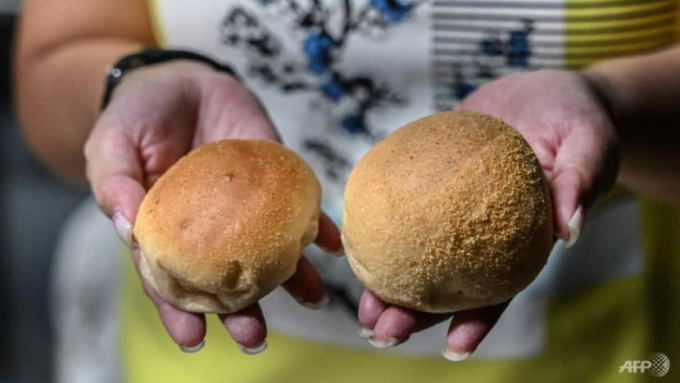June 3, 2025 | 09:13 GMT +7
June 3, 2025 | 09:13 GMT +7
Hotline: 0913.378.918
June 3, 2025 | 09:13 GMT +7
Hotline: 0913.378.918

Many Philippine bakers are shrinking the size of a popular breakfast roll to cope with higher inflation.
The slightly sweet and pillowy soft "pandesal", which Filipinos often dunk in coffee or stuff with cheese, used to weigh 35g at Matimyas Bakery, a breadmaker in suburban Manila.
But as the cost of local and imported ingredients soared in recent months, co-owner Jam Mauleon gradually reduced the size of the roll - known as the "poor man's bread" because it is cheap - to around 25g to avoid raising the 2.50 peso (about US$0.04) price.
She feared that even a slight increase would send cash-strapped customers in her neighbourhood to a rival bakery five blocks away.
"We had to reduce the serving size to survive," Mauleon told AFP, as children, workers and retirees arrived early to buy rolls baked in a brick oven that morning.
As the Philippines lifted COVID-19 restrictions and schoolchildren began returning to the classroom this year, Mauleon had hoped economic conditions for the bakery would improve.
But since December, as wheat and fuel prices surged, the price of flour has increased by more than 30 per cent, while sugar is up 25 per cent and salt costs 40 per cent more, she said.
The bakery survives day to day and does not make enough money to buy ingredients in bulk, leaving it vulnerable to changing prices in domestic and international markets.
After reducing the number of employees and absorbing higher costs, Mauleon was forced this week to raise the price of a pandesal by 20 per cent to three pesos.
Shrinking the size of the roll any further would affect its quality, she said.
"We will try it out if people will still buy it," Mauleon said.
"Pandesal is very important in the lives of Filipinos."
For mother-of-five Laarni Guarino, the price hike means her family now eats fewer rolls for breakfast.
"We will have to redo our budget. From five pieces each, my children will have to eat just three to four," Guarino, 35, told AFP.
"Fifty centavos is a big thing for poor people like us."
"SHRINKFLATION"
Lucito Chavez, president of an association representing local bakeries, said thousands of breadmakers were reeling from the higher cost for raw materials, most of which are imported.
"All of us are struggling, not to make profit, but to survive," Chavez told AFP.
"We have to protect the pandesal industry."
Inflation in the Philippines hit 6.1 per cent in June, the highest level in nearly four years, as steep fuel price hikes pushed up food and transport costs.
Lawmaker and economist Joey Salceda said bread would be hardest hit by "shrinkflation", where the size of a product gets smaller but the price stays the same.
"Wheat prices have increased by 165 per cent," he told reporters recently, urging bakeries to fortify their products with vitamins and minerals.
(CNA; AFP)

(VAN) Vikas Rambal has quietly built a $5 billion business empire in manufacturing, property and solar, and catapulted onto the Rich List.

(VAN) Available cropland now at less than five percent, according to latest geospatial assessment from FAO and UNOSAT.

(VAN) Alt Carbon has raised $12 million in a seed round as it plans to scale its carbon dioxide removal work in the South Asian nation.

(VAN) Attempts to bring down the price of the Japanese staple have had little effect amid a cost-of-living crisis.

(VAN) Fourth most important food crop in peril as Latin America and Caribbean suffer from slow-onset climate disaster.

(VAN) Shifting market dynamics and the noise around new legislation has propelled Trouw Nutrition’s research around early life nutrition in poultry. Today, it continues to be a key area of research.

(VAN) India is concerned about its food security and the livelihoods of its farmers if more US food imports are allowed.